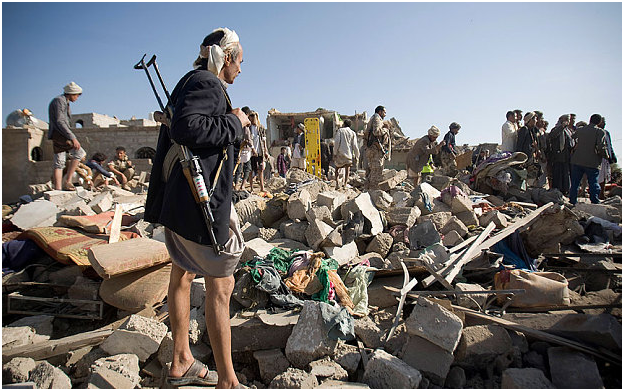No Sign of Saudi Ceasefire on the Ground, Yemen on Brink of Collapse
The people suffer in Yemen

NEW DELHI: Yemen’s city of Aden saw one of the fiercest rounds of fighting yet, as as Houthi fighters clashed with forces loyal to the country's president for control of the main airport. Airstrikes carried out by a coalition of Saudi-led Arab states continued, enabling the Popular Resistance Committees -- that are loyal to President Abd-Rabbu Mansour Hadi -- to retake positions from the revel Houthis.
Meanwhile, Saudi state media said that Saudi troops have repelled a major attack on their border by Houthi rebels. The unconfirmed reports say that “dozens” of rebels were killed.
As fighting rages, Yemen teeters on the brink of collapse, with an urgent need for food and water. The United Nations says that 1000 Yemenis have died in the five weeks of fighting, since the Saudis launched airstrikes on March 26. Relief workers have warned of a dire situation as civilians in Yemen remain in need of urgent medical and food supplies.
Worst still, there is no sign of reconciliation and an end to the fighting on the horizon. Hours after Saudi Arabia announced that it was ending its air campaign in Yemen about a week ago, fresh airstrikes pounded the war-torn country. Air strikes were reported in the port city of Aden and the central city of Taiz, as fighting broke out between Houthi rebels and pro-government forces in Aden and the city of Lahj, the capital of Huta, and the southern town of Daleh.
This new phase of fighting, punctuated by a few hours of peace, comes after the Saudi regime announced that it was ending its air campaign dubbed operation "Decisive Storm" and replacing it with a new campaign aimed at protecting civilians and preventing Houthi fighters from operating.
Brigadier-General Ahmed al-Asiri, the coalition's spokesperson made the announcement, saying that the coalition had achieved its targets in Yemen, the General said that a new operation called "Renewal of Hope" was being initiated and came into effect at midnight local time. "The coalition has completed the 'Decisive Storm' campaign at the request of the Yemeni government and the president of Yemen," Asiri said… The primary goals of the campaign have been achieved and sovereignty has been protected… We are able to confirm that the Houthis are no longer a threat to Yemenis or neighbouring countries,” Asiri said.
Yemen's Saudi and US-backed President Abd-Rabbu Mansour Hadi made a televised speech before that from Riyadh. "I extend on my behalf and on behalf of the Yemeni people sincere thanks and appreciation for the Arab and Muslim brothers and our partners in the coalition for supporting legitimacy," he said.
Houthi leaders seem to have welcomed the move, telling Reuters news agency that a political deal to end the conflict had almost been reached.
The peace, however, was short-lived. Houthi rebels meanwhile called for peace talks, with Houthi spokesperson Mohammed Abdulsalam posting on Facebook that UN sponsored talks should resume "but only after a complete halt of attacks.”
The resumed fighting indicates that peace in the region is a long way off, as should have been evident by the nature of the Saudi announcement to halt strikes. At the time of the announcement, there was no clarity on whether any deal had been reached or even initiated. Further, there was also no evidence that the Houthis had retreated from any of the territories they had captured in the preceding weeks, including the important city of Sanaa and parts of Aden.
The change in policy on the part of Saudi Arabia -- which seemed to be poised to launch a ground offensive against the rebels in Yemen -- was likely the result of some sort of agreement reached between the Saudis, Iran and other key players in the region, without much impact on the ground.
As the political aspirants in the region continue to play their games, the people of Yemen face the brunt of it all.



